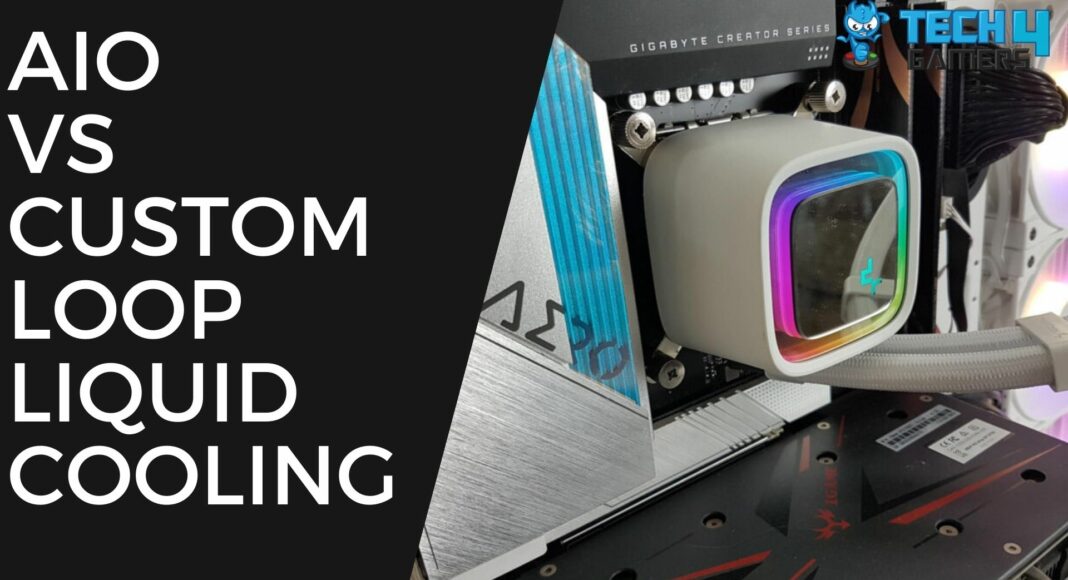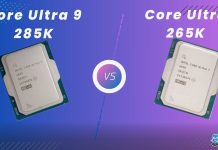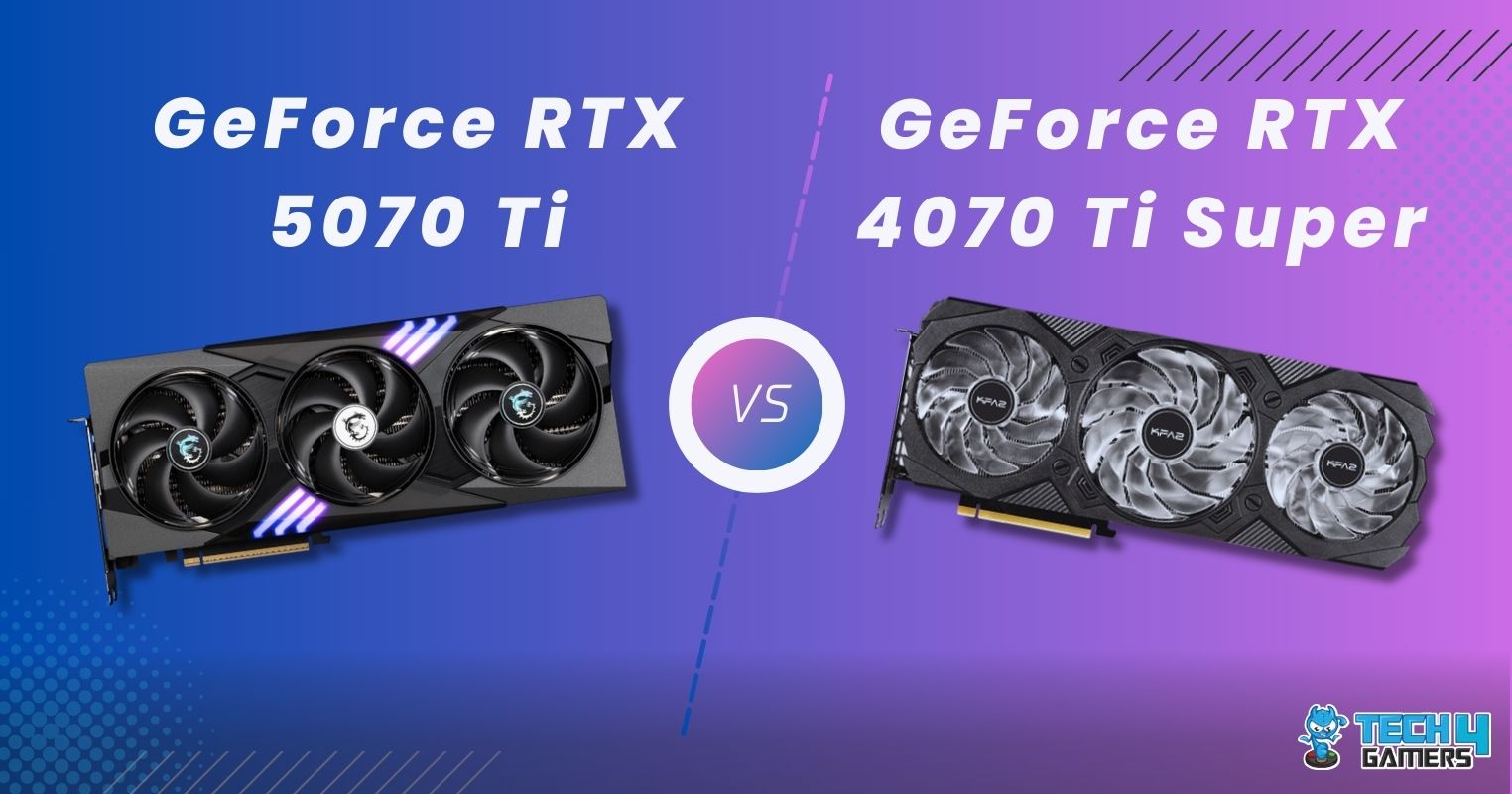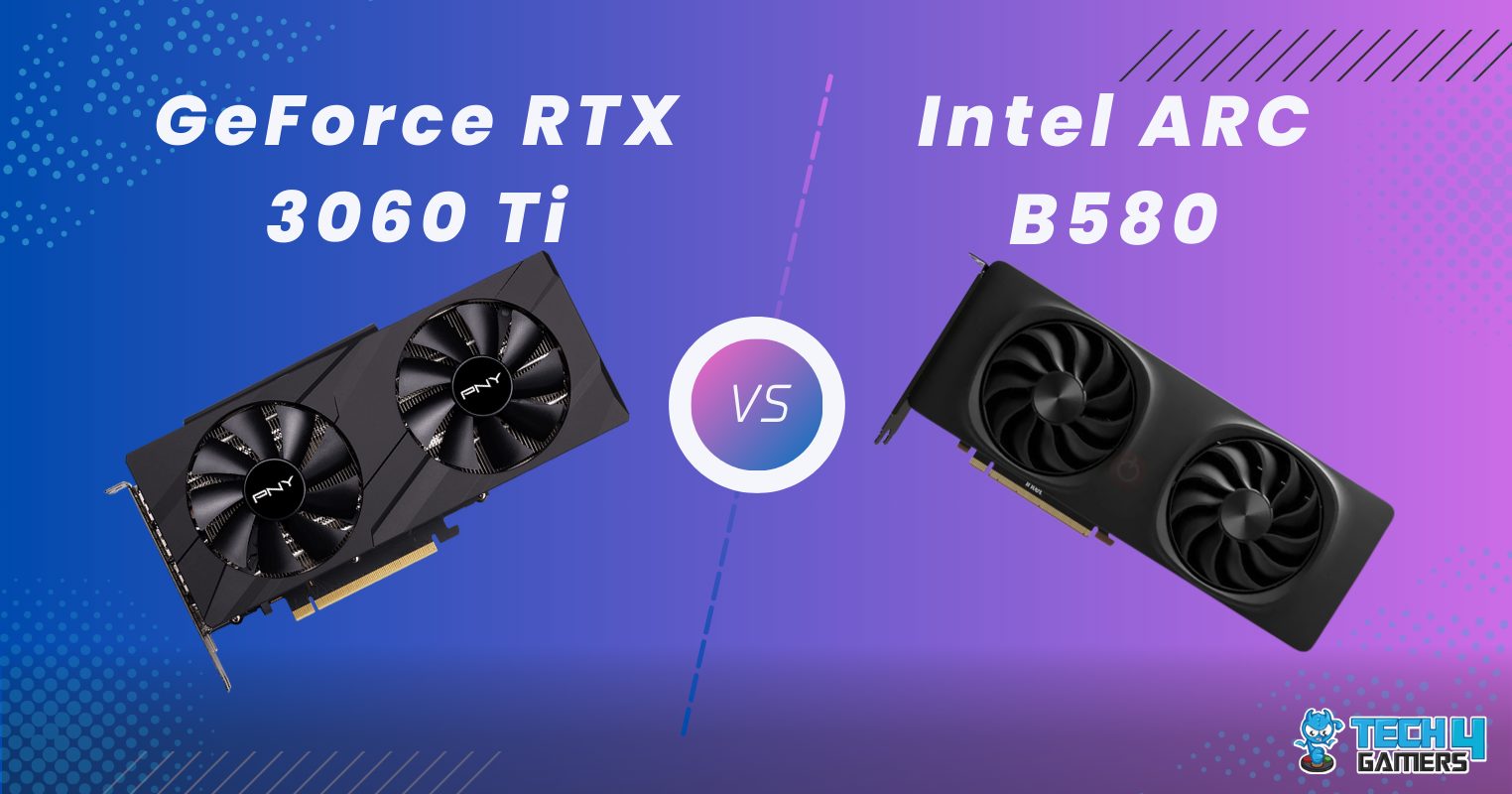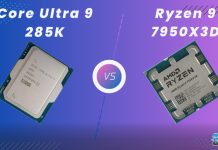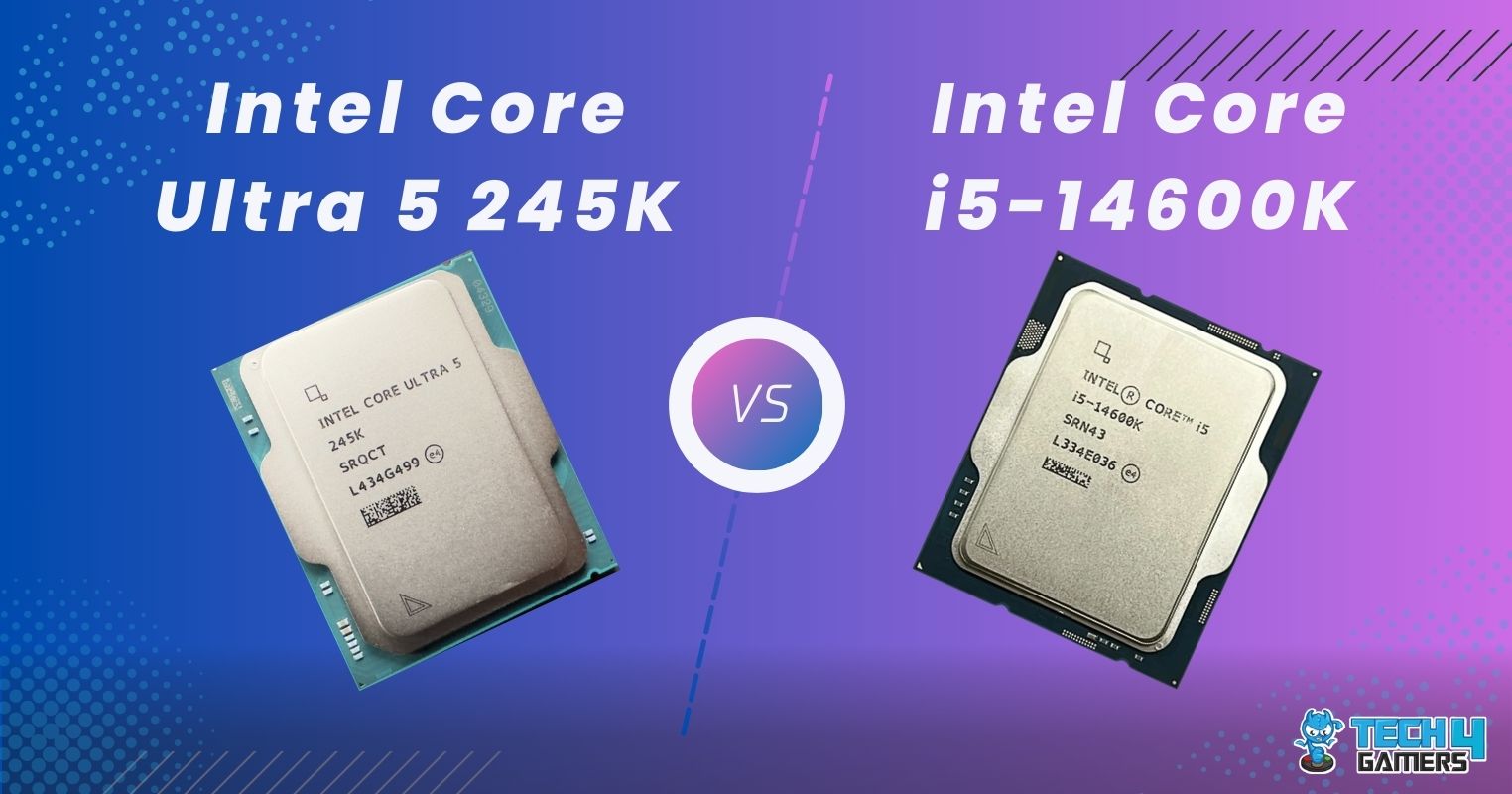Custom Loop Water Coolers
Rated: 7/10
AIO Coolers
Rated: 8/10
Pros And Cons
| Graphics | Pros | Cons |
|---|---|---|
| AIO Coolers | ✅Cheaper ✅No hassle | ❌No customization |
| Custom Loop Water Coolers | ✅High customizable ✅Can cool GPU as well | ❌More expensive ❌More hands-on |
- AIO Liquid Cooling is an all-in-one cooling solution that’s easy to install and costs less than Custom Loop setups. On the other hand, Custom Loops offer better performance, aesthetics, and quieter operations compared to the AIOs.
- AIOs don’t require a lot of preplanning to implement inside your PC and take much less time for installation compared to the Custom Loops, which can take days to assemble fully.
- Custom Loops can also include GPU cooling inside the loop, which can help improve the GPU performance, whereas the AIOs don’t have this feature.
- For the masses, we would recommend stepping towards an AIO as they are easier to install and take care of and cheaper.
AIO and custom loop liquid coolers strive to achieve the same target in different practical implementations. In this AIO vs Custom Loop Liquid Cooling comparison, we will delve into the difference between the both of them, ultimately deciding the user demographic for both technologies.
AIO Vs Custom Loop Liquid Cooling
To show the difference between AIO and Custom Loop Liquid coolers, we will evaluate them in various categories mentioned below:
Performance
The first thing to consider when comparing the two methods is the performance of both types of liquid cooling. When done correctly, the Custom Loop Liquid Cooling performs better than the AIO Coolers. This is because everything from the radiators, water block, pump, and reservoir can be customized to get the best performance out of the loop.
That’s not to say that AIOs are bad at their job. Any AIO from a reputable manufacturer will do a great job of cooling your CPU, even when overclocked. However, compared to the Custom Loop Liquid Cooling, the AIOs aren’t as good, especially when Custom Loop configurations also allow GPU cooling.
Installation
AIO coolers offer quick and straightforward installation, typically taking 10 minutes to an hour. In contrast, custom loop liquid cooling setups require meticulous assembly and planning, including connecting individual parts and arranging piping throughout the PC case. This process can take a day or longer, especially for newcomers, necessitating expert assistance.
All of this can be very confusing for a newbie as it is a delicate process that requires a lot of planning, especially if you want to cool other PC components like the motherboard and the GPU alongside the CPU. But the performance of Custom Loop Liquid Cooling makes the whole thing worth it. You can also check out our guide on how to watercool GPU.
AIOs excel in installation ease and time efficiency compared to custom loop setups.
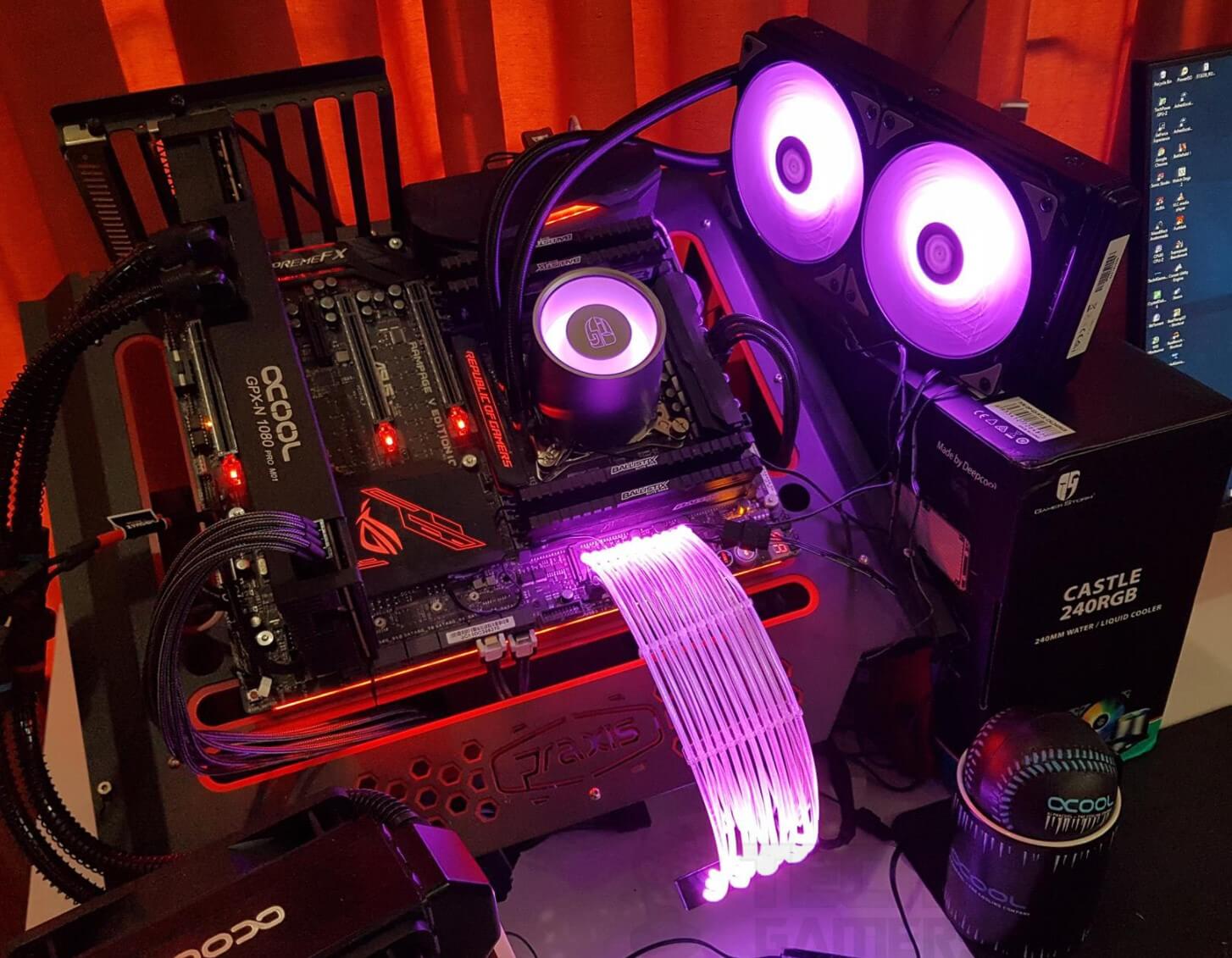
Maintenance
Custom loops demand extensive research, part compatibility checks, and assembly, posing risks of leakage and corrosion. Maintenance includes frequent testing for leaks, monitoring for corrosion, and periodic coolant replacement and radiator cleaning.
In contrast, AIO coolers offer a hassle-free solution with pre-assembled units and manufacturer-tested leak prevention. Maintenance involves occasional fan and radiator cleaning, making AIOs a more convenient choice for users seeking lower maintenance requirements.
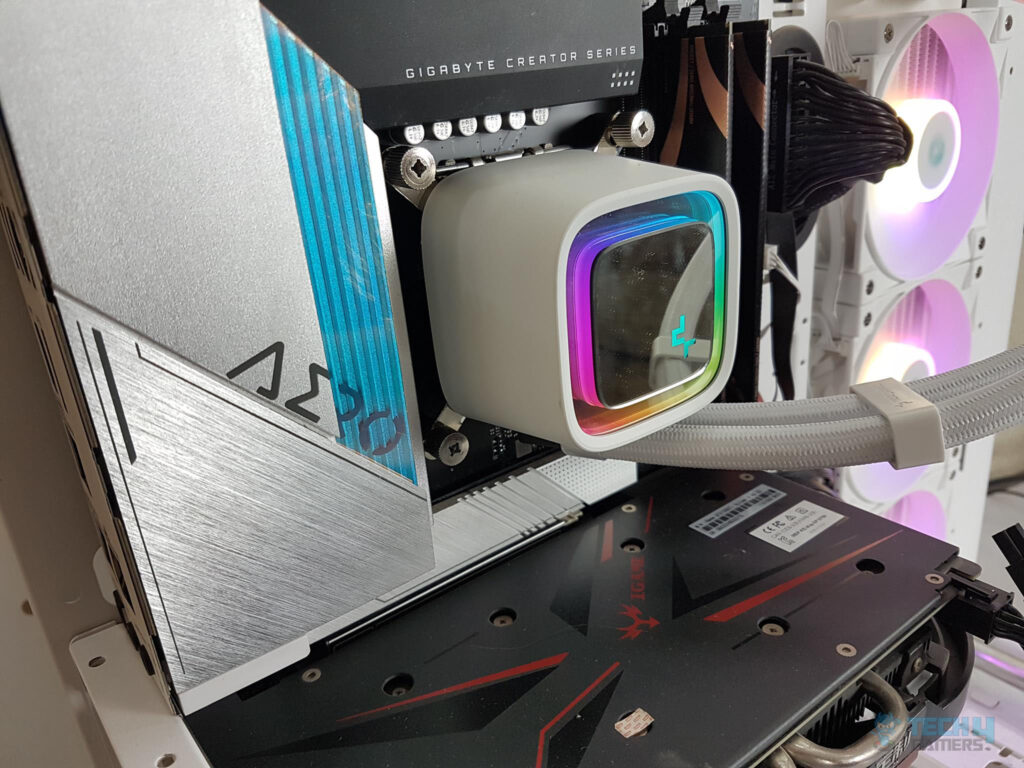
Noise
The distinction isn’t as clear when comparing AIO vs Custom Loop Liquid Cooling noise levels.
Both systems rely on cooling fans, radiators, and pumps, contributing to noise. AIOs feature fans with adjustable RPMs, but increased workload can result in louder operation. Larger radiators exacerbate this issue. Additionally, many AIOs use noisy pumps for coolant circulation. Conversely, Custom Loop options offer quieter pumps and the potential to dampen GPU fan noise.
Overall, Custom Loop Liquid Cooling tends to provide quieter operation than AIOs.
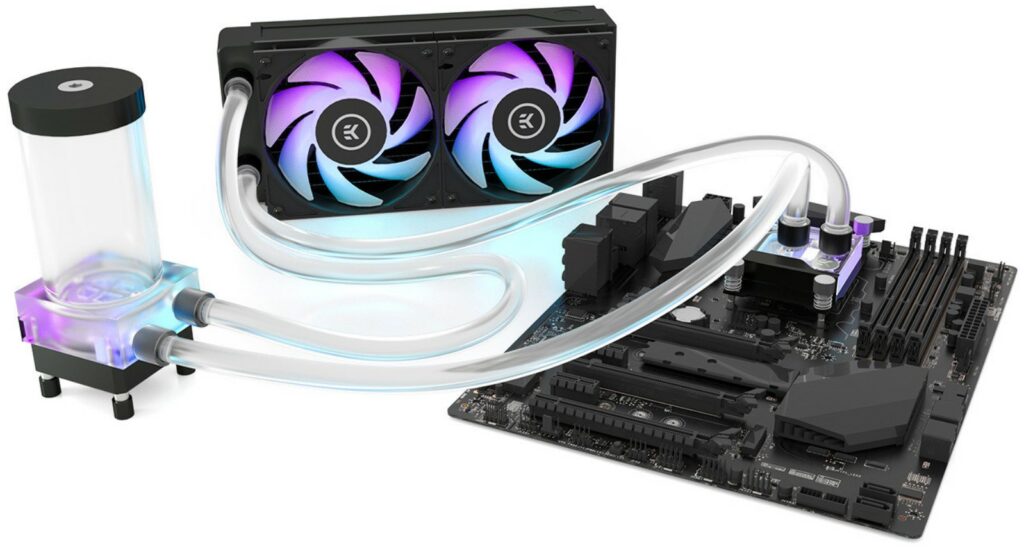
Aesthetics
Comparing the criteria of aesthetics, we can say there’s no objective winner, but the Custom Loops might have an advantage over the AIOs in terms of customization. As you pick out all the parts when assembling a custom loop, you can make it look exactly how you want.
In addition, solid piping across the PC case offers an aesthetic appeal that is not found in AIOs. You can also customize the coolant color in the pipes, enhancing visual appeal. Custom Loop Liquid Cooling provides more customization options than AIOs, which lack this flexibility.
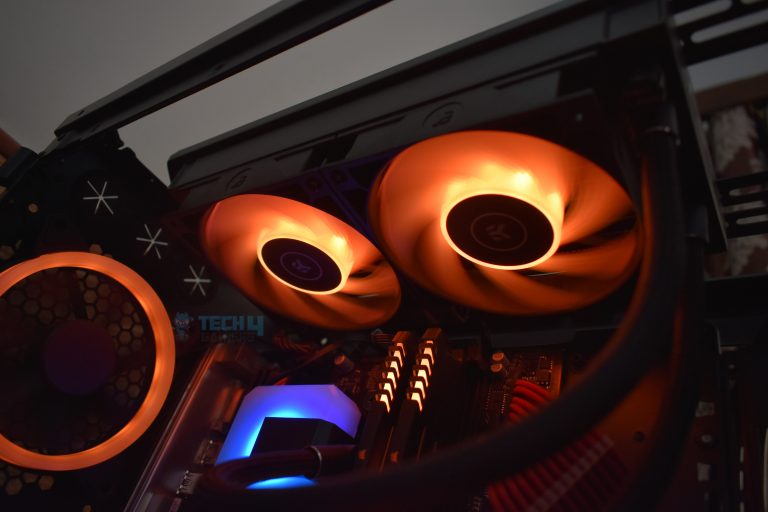
Price
The last thing to talk about when comparing the two is the pricing. You’ll find that most AIOs from reputable manufacturers have low prices compared to a Custom Loop Liquid Cooling setup.
Custom Loops offer superior performance but come at a high cost, typically from $350 to $600. Investing in a custom loop setup only if you have top-of-the-line PC specs and additional funds is advisable, as they can be more expensive than many other PC components combined.
On the other hand, AIOs have a much cheaper price range, starting from $100 and going up to $400. These may depend on different sizes of fans, the number of fans, and the sizes of radiators. It’s important to check the compatibility with the rest of your system when buying an AIO, just like a Custom Loop.
Which Is Right For You?
AIO Coolers: These coolers are good for a hassle-free experience, both in installation and maintenance. Though the performance does not replicate that of custom loop coolers, they are still more than adequate for almost all the most powerful CPUs of the modern era.
Custom Loop Liquid Coolers: These coolers provide a more hands-on experience, which some people might enjoy. They offer great customization, along with brilliant performance. This is reflected in their price, which suits them better to enthusiasts than the average Joe.
The decision between these two technologies verges on a few factors, the most salient of which include customization, price, and convenience. AIOs seem the better option for most people, but if you want a tailor-made enthusiast-level PC, Custom Liquid Coolers are the way to go.
If you want to get a custom loop after all this debate, we highly recommend giving our best water cooling kit article a glance!
Frequently Asked Questions
Modifying parts carries risks, albeit small. Replacing stock coolers may void warranties, especially for CPUs. There’s also a risk of leaks, which could damage components. While leaks are rare, it’s essential to conduct a leak test before using your computer after installing a water-cooling loop.
Key tools include screwdrivers, pliers, an anti-static wrist wrap, paper towels, and a flashlight. You’ll also need something to cut tubing, like a knife or scissors. These tools are similar to those used for building a computer.
It is recommended that you replace the liquid in your custom loop water cooler every 12 months, but it is no big deal if you leave it in for longer.
Similar Articles
Thank you! Please share your positive feedback. 🔋
How could we improve this post? Please Help us. 😔
[Comparisons Expert]
Abdemanaf is a skilled creative writer who has been honing his craft since 2011. While initially working in different fields, he found a passion for technology and has been exploring the tech world since early 2015. Over the years, he has developed an in-depth knowledge of the latest tech trends and product offerings by various companies.
Abdemanaf’s writing reflects his analytical mindset and ability to think critically. He has a knack for breaking down complex technical information into easily digestible pieces, making his articles engaging and accessible to readers from all backgrounds. In February 2022, he joined Tech4Gamers as a blog and product comparison writer, where he has been able to hone his skills further.
As a writer, Abdemanaf is dedicated to staying up-to-date with the latest technological advancements and trends, enabling him to provide readers with the most relevant and accurate information. He is always eager to learn more and is constantly seeking new challenges to improve his skills.
Get In Touch: manaf@tech4gamers.com


